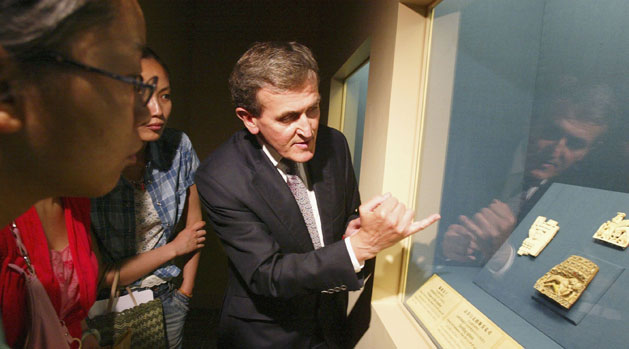'Time for reinvention' as Neil MacGregor leaves British Museum
The departure of its 'moral and engaging' director will be a great blow to the institution, critics say

A free daily email with the biggest news stories of the day – and the best features from TheWeek.com
You are now subscribed
Your newsletter sign-up was successful
The director of the British Museum, Neil MacGregor, has announced he is to step down from his job at the end of the year.
MacGregor, 68, has been at the helm of the museum since 2002, but told colleagues he had made the "difficult decision" because he no longer wanted to work full time.
MacGregor is perhaps best known for his Radio 4 series A History Of The World In 100 Objects, which was inspired by the museum's collection. The news of his departure from the museum prompted his admirers to salute the significant cultural contribution he has made.
The Week
Escape your echo chamber. Get the facts behind the news, plus analysis from multiple perspectives.

Sign up for The Week's Free Newsletters
From our morning news briefing to a weekly Good News Newsletter, get the best of The Week delivered directly to your inbox.
From our morning news briefing to a weekly Good News Newsletter, get the best of The Week delivered directly to your inbox.
Perhaps his greatest achievement, wrote arts editor Will Gompertz for the BBC, has been transforming the museum from "a slightly old-fashioned institution with a chilly welcome, into one of the world's most popular visitor attractions without feeling the need to dumb down".
"His success," added Gompertz, "stems from having the confidence to assume the public are not stupid, but are open-minded and intellectually curious."
More than this, wrote Rupert Christiansen in The Daily Telegraph, MacGregor has imbued the British Museum with a high sense of moral purpose. He has emphasised the museum's foundations "in liberal Enlightenment values and a sense of engagement with the world".
Christiansen points out that during the Iraq war, MacGregor took a leading role in salvaging antiquities from pillaging and bombing, as well as helping Baghdad reconstruct its collection.
A free daily email with the biggest news stories of the day – and the best features from TheWeek.com
But Christiansen is not without his criticisms, noting that MacGregor was less adept at "the nitty-gritty details of the visitor experience" and that the big disappointment of his tenure was the "botched exhibition wing", which opened last year.
People forget what a mess the museum was in before MacGregor arrived, said Richard Morrison in The Times. "Staff seething with mutiny, its finances in disarray, the repercussions from the budget and time overruns on its Great Court redevelopment were still provoking press ridicule." And abroad, critics claimed the museum's collections were "parades of imperialist grand larceny”.
Under MacGregor's direction, Morrison said, the museum has become "a fortress of superb scholarship and enlightened missionary work". It sounds almost heretical, Morrison added, but "Neil MacGregor is almost bigger than the institution".
Yes, MacGregor found brilliant new ways to tell and show the past, said The Guardian’s art critic Jonathan Jones, "but they are not the only ones”. It’s time to reinvent again.
Jones added MacGregor made good arguments for keeping controversial works such as the Parthenon marbles in the UK as part of a multicultural museum. But he added that "with IS attacking world art and antiquities with unprecedented barbarity, perhaps it is time for museums to start speaking up for civilisation in less diplomatic ways".
-
 The Week Unwrapped: Do the Freemasons have too much sway in the police force?
The Week Unwrapped: Do the Freemasons have too much sway in the police force?Podcast Plus, what does the growing popularity of prediction markets mean for the future? And why are UK film and TV workers struggling?
-
 Properties of the week: pretty thatched cottages
Properties of the week: pretty thatched cottagesThe Week Recommends Featuring homes in West Sussex, Dorset and Suffolk
-
 The week’s best photos
The week’s best photosIn Pictures An explosive meal, a carnival of joy, and more